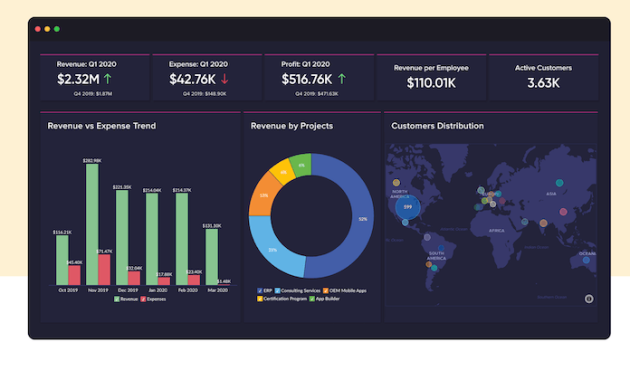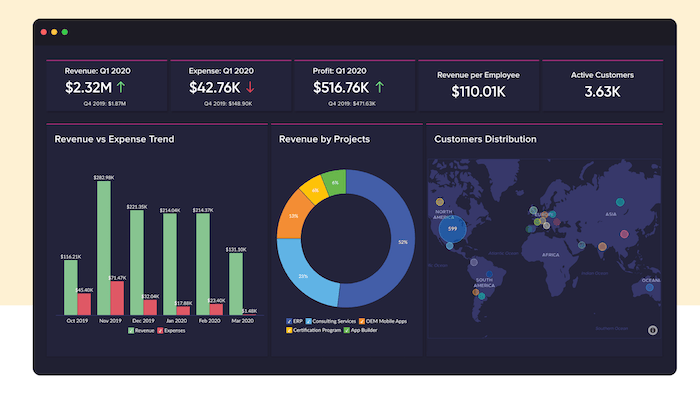
How to Choose Business Intelligence Software That Works: A Practical Guide
The business landscape is constantly evolving. Data is the new currency. Companies that harness the power of their data are better positioned to thrive. Business intelligence (BI) software is the key. It unlocks valuable insights. This guide provides practical advice. It helps you choose BI software that truly works.
Choosing the right business intelligence software is crucial. It can significantly impact your decision-making. It can also improve operational efficiency. The wrong choice can lead to wasted resources. It can also result in inaccurate insights. This article will guide you through the selection process. It will help you find the best fit for your organization.
Understanding Your Needs Before Choosing
Before diving into software options, take a step back. Assess your current data landscape. Define your business goals. Identify the specific problems you want to solve. This upfront analysis is vital. It ensures you select the right business intelligence software.
Define Business Goals
What are your primary objectives? Are you looking to improve sales? Are you trying to optimize marketing campaigns? Are you focusing on streamlining operations? Clearly defined goals guide your software selection. They also help you measure success later on.
Assess Your Data Sources
Where does your data reside? Do you have data in databases? Do you use cloud services? Are you working with spreadsheets? The business intelligence software must integrate with your data sources. Ensure it can handle the volume and variety of your data.
Identify Key Performance Indicators (KPIs)
What metrics matter most to your business? Identify your key performance indicators. These metrics will drive your reporting needs. They will also influence the features you require from the business intelligence software. Examples include revenue, customer acquisition cost, or website traffic.
Key Features to Consider in Business Intelligence Software
Business intelligence software offers a range of features. Selecting the right features is essential. It aligns with your specific needs. Consider these key aspects:
Data Integration and Connectivity
The software should easily connect to your data sources. It must handle various data formats. It should also offer pre-built connectors. These connectors simplify the process of data extraction. They also help with transformation and loading (ETL).
Data Visualization Capabilities
Effective data visualization is critical. The software should offer diverse chart types. These include graphs, and dashboards. These tools help communicate insights clearly. Look for interactive dashboards. They allow users to explore data in more detail.
Reporting and Analysis Tools
The software should provide robust reporting features. It should also include analysis tools. These tools enable users to generate custom reports. They also allow for ad-hoc analysis. Features like drill-down capabilities are important. These allow users to explore data at different levels.
Ease of Use and User Interface
The software should have an intuitive interface. It should be easy for users to learn and use. Consider the learning curve. Also, consider the level of technical expertise required. A user-friendly interface promotes adoption. It also ensures wider usage across your organization.
Scalability and Performance
Your business needs will likely evolve. The business intelligence software should scale with your growth. It should handle increasing data volumes. It should also maintain optimal performance. Consider the software’s ability to handle concurrent users.
Mobile Accessibility
Accessing data on the go is increasingly important. Choose software with mobile capabilities. This allows users to view dashboards and reports. They can access them from their smartphones and tablets. This will improve decision-making.
Security and Compliance
Data security is paramount. The software should have robust security features. These features protect your sensitive data. Ensure it complies with industry regulations. These regulations include GDPR and HIPAA.
Evaluating Business Intelligence Software Vendors
Choosing the right vendor is as crucial as choosing the right software. Evaluate potential vendors carefully. Consider these factors:
Vendor Reputation and Experience
Research the vendor’s reputation. Check their experience in the business intelligence software market. Read reviews and case studies. This will provide insights into their customer service and support. Also, check their track record.
Pricing and Licensing Models
Understand the pricing structure. Compare different licensing options. Consider the total cost of ownership. This includes software licenses, maintenance, and support. Ensure the pricing aligns with your budget and usage needs.
Support and Training
Assess the vendor’s support offerings. Ensure they provide adequate training. This training helps your team use the software effectively. Check the availability of documentation. Also, check the options for support channels.
Integration with Existing Systems
The software should integrate seamlessly with your existing systems. This integration includes CRM and ERP. This will avoid data silos. It also streamlines your workflow. It helps you get the most from your business intelligence software.
Implementation and Training
Once you select the software, plan your implementation. Implement your plan carefully. Provide adequate training to your team. This will ensure a smooth transition. It also maximizes the software’s value.
Planning Your Implementation
Develop a detailed implementation plan. This plan outlines the steps involved. It also sets timelines and assigns responsibilities. Involve key stakeholders. Ensure a coordinated approach.
Data Migration and Preparation
Prepare your data for migration. Clean and transform your data. Ensure data accuracy and consistency. Migrate the data into the new system.
User Training and Adoption
Provide comprehensive training to your users. This training should cover the software’s features. It should also include best practices. Encourage user adoption. Provide ongoing support. This ensures users can leverage the software effectively.
Measuring the Success of Your Business Intelligence Software
After implementation, measure your success. Track your key performance indicators. Evaluate the impact of the software. This will show its effectiveness.
Tracking Key Performance Indicators
Monitor your KPIs regularly. Measure the improvements. Identify areas for optimization. Ensure the software delivers the expected results. The right business intelligence software enables this.
Gathering User Feedback
Gather feedback from your users. Understand their experience with the software. Identify any challenges. Make adjustments as needed. This iterative process will improve the software’s value.
Regularly Reviewing and Optimizing
Regularly review your business intelligence software. Assess its performance. Identify areas for improvement. Optimize your dashboards and reports. This ensures the software remains effective. It also helps you meet your evolving business needs.
Choosing the right business intelligence software is a journey. It requires careful planning. It also requires continuous evaluation. By following these steps, you can select software. This software will empower your team. It will also drive data-driven decision-making. Embrace the power of data. Your business will thrive.
The selection process is important. It helps you find the best business intelligence software. It is essential for business success. This guide provides a comprehensive approach. It helps you select the right tools. This will improve your data analysis. It helps you make informed decisions. This guide ensures you choose business intelligence software that works. This is key to gaining a competitive advantage. The right business intelligence software will help you. It will help you achieve your goals.
Remember to prioritize your needs. Evaluate vendors thoroughly. Implement the software effectively. This will ensure a successful outcome. The right business intelligence software is a valuable asset. It will help you make informed decisions. It will also help you drive business growth. Start your journey today. Choose business intelligence software that works.
In conclusion, selecting the right business intelligence software is critical. It is crucial for business success. This guide provides a practical framework. It helps you make informed decisions. Choose the right software. It helps you unlock your data’s potential. It also helps you drive business growth.
The final step is to ensure that your team can use the software. This is key to success. Proper training and support are essential. Regular reviews and optimizations are also important. This is how you get the most from your investment in business intelligence software.
[See also: Related Article Titles]

